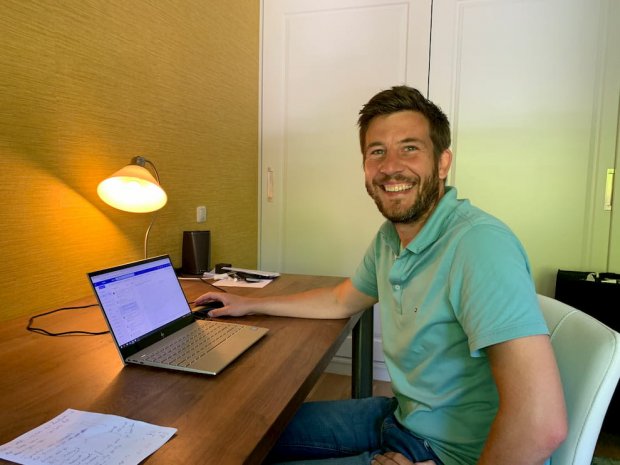Translating Data into Insights that Lead to Recovery

We’ve never introduced him before, but he and his team play an essential role at Schiphol. And during the coronavirus pandemic, his job is more important than ever. Meet Michael Arntzen: head of Traffic Analysis & Forecasting (TAF). Michael and his team are responsible for collecting information from airlines and using their expertise to turn those numbers into key insights and scenarios for Schiphol. And now, they play an essential role in the road to recovery.
Life-long passion
Michael has been fascinated with aviation ever since he was a little boy. His grandfather used to take him to a nearby Air Force base, and he still remembers how excited he used to get, watching those jets take flight. No surprise, then, that he studied Aerospace Engineering and acquired a Ph.D. in Aircraft Noise.
‘I’ve always been passionate about the intricate, technical details of aircraft, and also all of the complex business streams of the aviation industry,’ Michael says. ‘So after spending five years on Schiphol’s noise and stakeholder development team, I was excited to apply my analytical and people skills to such an essential part of the Schiphol organisation.’
Single source of truth
TAF is responsible for the data about incoming and outgoing flights and passenger and cargo numbers. After collecting essential schedules and plans from every airline, Michael and his team compile, analyse and distil that data into meaningful information for the airport. They add business intelligence, the latest industry insights and historical data to fill in any gaps and make the best predictions possible about what is to come.
It is only when that data is translated into meaningful information that it becomes useful to airlines and the airports. So the team must understand the key intricacies of the industry and focus on the realities of the business. ‘We’re like interpreters,’ he says. ‘We have to be fluent in both “data” and in “airline” to really have an impact.’
Timing is everything
During “normal” operations, TAF’s data supports airlines in different ways. In the short term, the schedules compiled by TAF help to ensure that staffing and security are at optimal levels, so that passengers flow smoothly through the airport and have an excellent travel experience. From security to retail and hospitality, every part of Schiphol uses these schedules to make their plans. Mid- and long-term forecasts help Schiphol predict and plan for the changes that are expected.
‘Things like airport expansion and growth take a long time and a huge investment,’ he explains. ‘So we sometimes look deep into the future and create scenarios to try to predict the direction in which Schiphol needs to move. That’s how the airport can continue to serve airlines and passengers in the most effective way.’ In fact, Michael and his team have previously looked as far ahead as 2050, to ensure that whatever the future brings, Schiphol will be ready.
The new normal
But the impact of the coronavirus has gone far beyond predictions. Since January, Michael and his team have been working round-the-clock to ensure that Schiphol has the most up-to-date information possible. While they used to produce major updates to the schedule every six weeks, the team now communicates with Schiphol operations on a weekly basis, or even more frequently. ‘Things are changing so fast, we’re hardly done analysing one set of schedules when a whole new set of data comes in,’ Michael laughs. ‘We constantly refresh our forecasts and scenarios, so that Schiphol can make the best decisions possible.
Speaking one language
The scenarios that TAF develops have taken on a new dimension since the corona crisis began. ‘We need to focus not only on what the airport will look like when countries start to reopen, but how the entire industry will be impacted in the long term,’ he says. ‘It took about three years before Schiphol’s passenger numbers recovered after the financial crisis in 2008. It may well take a similar amount of time for our recovery after COVID-19. ’
Michael has no doubt that the recovery will happen. He and his team simply want to ensure that both Schiphol and the airlines have the right information to guide them. ‘This virus has impacted the airline industry in every country in the world. It is a unique situation. But there is one element that we all use for our decisions, regardless of our background: data. And we believe that a data-driven approach will lead to the best decisions.’
The post-corona picture
But, what does “recovery” look like? Is it a return to business-as-usual? Or will the airline industry be forever changed for the better? Michael certainly hopes so. ‘I’ve had a love for aviation my whole life,’ he says, ‘so of course I want my children to have the same opportunities to travel the world, experience other cultures and have great adventures. But at the same time, there are some key issues in the industry that still need to be addressed. Issues around sustainability, noise, economics and regulation. I look forward to helping Schiphol – and the industry – address them.’
There’s a lot more to tell you about Michael, the TAF team and their work. Download the full article here for more detail!


